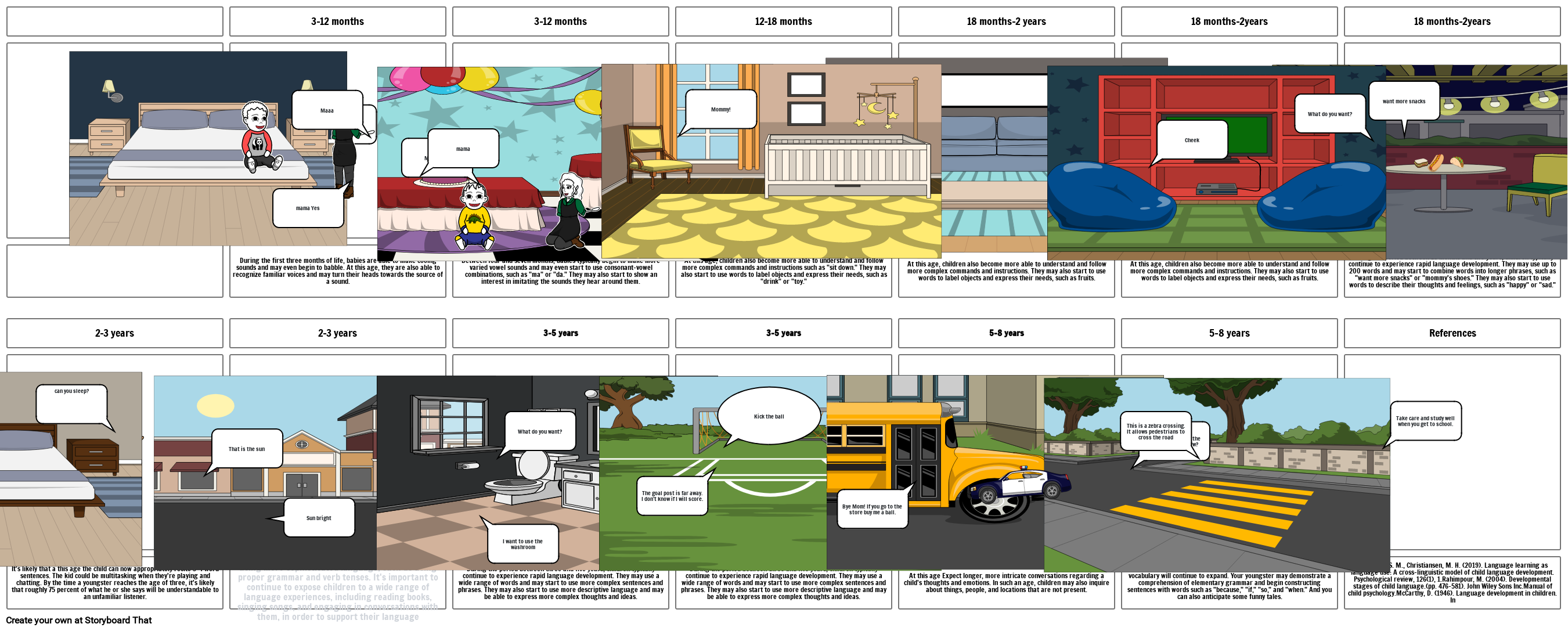Child language development

Storyboard Text
- Yees! how are you doing?
- 3-12 months
- mama Yes
- Maaa
- Maaaa
- ma ma ma ma
- Ma Ma Ma
- mama
- 3-12 months
- Hey Shawn!
- Sit Down
- 12-18 months
- Mommy!
- Name the fruits on the table.
- CarrotOrangeBanana
- 18 months-2 years
- Which part of my head am I touching?
- 18 months-2years
- Cheek
- What do you want?
- 18 months-2years
- want more snacks
- Mama......Sleep can't
- 2-3 years
- can you sleep?
- During the first three months of life, babies are able to make cooing sounds and may even begin to babble. At this age, they are also able to recognize familiar voices and may turn their heads towards the source of a sound.
- 2-3 years
- Between four and seven months, babies typically begin to make more varied vowel sounds and may even start to use consonant-vowel combinations, such as "ma" or "da." They may also start to show an interest in imitating the sounds they hear around them.
- 3-5 years
- At this age, children also become more able to understand and follow more complex commands and instructions such as "sit down." They may also start to use words to label objects and express their needs, such as "drink" or "toy."
- 3-5 years
- Kick the ball
- At this age, children also become more able to understand and follow more complex commands and instructions. They may also start to use words to label objects and express their needs, such as fruits.
- 5-8 years
- At this age, children also become more able to understand and follow more complex commands and instructions. They may also start to use words to label objects and express their needs, such as fruits.
- 5-8 years
- During the period between 18 months and two years, children typically continue to experience rapid language development. They may use up to 200 words and may start to combine words into longer phrases, such as "want more snacks" or "mommy's shoes." They may also start to use words to describe their thoughts and feelings, such as "happy" or "sad."
- References
- Take care and study well when you get to school.
- This is a zebra crossing that allows pedestrians to walk through.
- Why is the road marked yello?
- It's likely that a this age the child can now appropriately recite 3–4 word sentences. The kid could be multitasking when they're playing and chatting. By the time a youngster reaches the age of three, it's likely that roughly 75 percent of what he or she says will be understandable to an unfamiliar listener.
- That is the sun
- As children's language skills continue to develop at his age, they may also begin to show an interest in using more sophisticated language, such as using proper grammar and verb tenses. It's important to continue to expose children to a wide range of language experiences, including reading books, singing songs, and engaging in conversations with them, in order to support their language development.
- Sun bright
- During the period between three and five years, children typically continue to experience rapid language development. They may use a wide range of words and may start to use more complex sentences and phrases. They may also start to use more descriptive language and may be able to express more complex thoughts and ideas.
- I want to use the washroom
- What do you want?
- The goal post is far away. I don't know if I will score.
- During the period between three and five years, children typically continue to experience rapid language development. They may use a wide range of words and may start to use more complex sentences and phrases. They may also start to use more descriptive language and may be able to express more complex thoughts and ideas.
- Bye Mom! If you go to the store buy me a ball.
- At this age Expect longer, more intricate conversations regarding a child's thoughts and emotions. In such an age, children may also inquire about things, people, and locations that are not present.
- This is a zebra crossing. It allows pedestrians to cross the road
- A child at this age will likely wish to discuss a variety of topics, and their vocabulary will continue to expand. Your youngster may demonstrate a comprehension of elementary grammar and begin constructing sentences with words such as "because," "if," "so," and "when." And you can also anticipate some funny tales.
- Why is this part of the road marked yellow?
- McCauley, S. M., Christiansen, M. H. (2019). Language learning as language use: A cross-linguistic model of child language development. Psychological review, 126(1), 1.Rahimpour, M. (2004). Developmental stages of child language.(pp. 476-581). John Wiley Sons Inc.Manual of child psychology.McCarthy, D. (1946). Language development in children. In
Over 30 Million Storyboards Created

